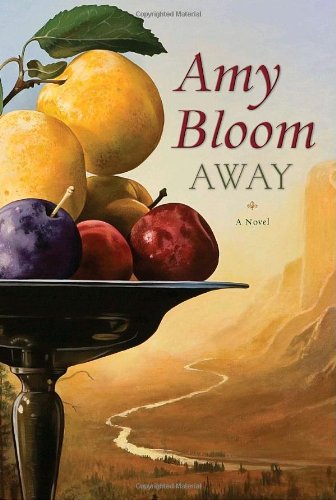Away
In July of 1924, Lillian Leyb stands in line with hundreds of other women, waiting to interview for a job as a seamstress that has opened up at the Goldfadn Theater, located on New York City’s Lower East Side. A recent immigrant from Turov, Russia, Lillian speaks little English, but manages to impress the owner of the theater, Reuben Burstein. Subsequent developments lead to an improvement of her circumstances. Things are never what they seem, however. When startling news from home reaches her, there is nothing so important in her new life to keep her from embarking on a cross-country trek, her ultimate goal being to reach Siberia.
This is a breathtaking jewel of a novel. The narrative draws the reader down to the gritty streets of New York City, its lights, sounds and smells, the multitudes constantly moving and striving for a higher rung on the ladder. Then you are off to Chicago and across the plains, where you land in the hardcore and corrupt world of Seattle’s Skid Row. Finally, there is Alaska, the vast, frozen wilderness, home to outcasts, the detached, and those whose dreams have somehow gone awry. Along the way, Lillian interacts with an array of memorable characters, from Yaakov Shimmelman to Gumdrop and Chinky Chang, each of whom adds his or her own form of wisdom and, sometimes, humor to the story.
I highly recommend this novel. (AL)
Author Amy Bloom’s father was a journalist. ‘There’s a story about a woman who… tried to walk to Siberia,’ he announced one evening. ‘Why would anyone do that?’ Like uncut gems, the words lay in front of his daughter. The result is Away.
Following the murder of her family inRussiaand the disappearance of her three-year-old daughter, Lillian Leyb flees toAmericawith her cousin’sNew Yorkaddress pinned to her blouse. In the summer of 1924, theLower East Sideis heaving with 500,000 Jews. After a month in her cousin’s sweatshop, Lillian, her hands stained with blue dye, has perfected three answers to questions from prospective employers: ‘Very well, thank you’ if the question seems to be about her health; ‘I am a seamstress – my father was a tailor’ if the question contains the words ‘sew’, ‘costume’, or ‘work’; ‘I attend night classes’ said with a dazzling smile, in response to any question she doesn’t understand.
Thus equipped, she is hired as a seamstress by impresario Reuben Burstein and his matinee-idol son Meyer, and later finds her way into their beds. However, when another cousin arrives in New York with news of Sophie, Lillian’s daughter, Lillian embarks on an odyssey epic in sweep yet intimate in detail: vignettes, cameo portraits of a gallery of characters who help or hinder Lillian: a black prostitute and her pimp, a constable, three motherless children, gold prospectors, oriental prisoners, drifters and immigrants with an eye to the main chance or just hoping for the best.
Infused with insight and humanity, the writing is vivid, earthy, hilarious, yet poignant, tender, Lillian’s love for Sophie and the lengths to which she will go expressed in exquisite prose—leaving an ache of empathy and longing in this reader’s chest until after the last page was turned. (JH)










